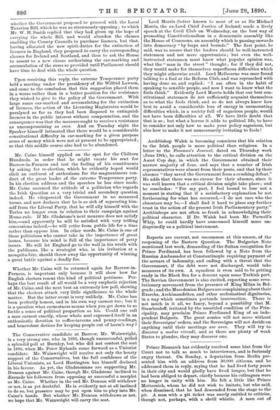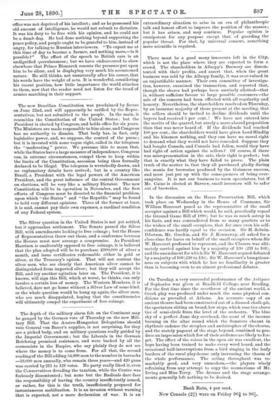Prince Bismarck has evidently received some hint from the Court
not to talk so much to interviewers, and is furiously angry thereat. On Sunday, a deputation from Berlin pre- sented him with an address from 30,000 citizens, and he addressed them in reply, saying that he had lived forty years in their city and would gladly have lived longer, but that he had been obliged to depart, chiefly because his colleagues were no longer in unity with him. He felt a little like Prince Metternich, whom he did not wish to imitate, but who said, when dismissed, that he had descended from the stage to the pit. A man with a pit ticket was surely entitled to criticise, though not, perhaps, with a shrill whistle. A man out of office was not deprived of his intellect ; and as he possessed his old amount of intelligence, he would not submit to dictation. It was his duty to be free with his opinion, and he could not be a dumb dog. He had done nothing beyond supporting the peace policy, and people ought to be grateful to him, instead of angry, for talking to Russian interviewers. "To expect me at this time of day to become a farmer, and nothing more,—is it possible ?" The effect of the speech to British ears is an undignified querulousness ; but we have endeavoured to show elsewhere that Prince Bismarck resents the pressure put upon him to be silent, and is displaying very much his accustomed nature. He still thinks, not unnaturally after his career, that his words have the weight of acts. It is wonderful, considering his recent position, how little importance the world attaches to them, now that the reader need not listen for the tread of armies marching in their support.



















































 Previous page
Previous page